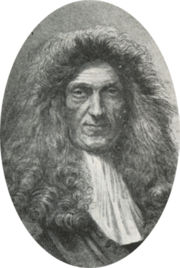
Guy-Crescent Fagon
Encyclopedia

Guy de La Brosse
Guy de La Brosse , was a French botanist, doctor, and pharmacist. A physician to King Louis XIII of France, he is also notable for the creation of a major botanical garden of medicinal herbs, which was commissioned by the king...
, had founded the Royal Gardens. Fagon was director of the gardens too. His significance in botany is reflected in the genus Fagonia
Fagonia
Fagonia is a genus of flowering plants in the caltrop family, Zygophyllaceae. The roughly 18 species it contains are commonly known as fagonbushes. Their distribution includes parts of Africa, the Mediterranean Basin, and parts of the Americas....
being named after him. He also acted as the physician of Louis XIV of France
Louis XIV of France
Louis XIV , known as Louis the Great or the Sun King , was a Bourbon monarch who ruled as King of France and Navarre. His reign, from 1643 to his death in 1715, began at the age of four and lasted seventy-two years, three months, and eighteen days...
. In 1669 he was made an honorary member of the French Academy of Sciences
French Academy of Sciences
The French Academy of Sciences is a learned society, founded in 1666 by Louis XIV at the suggestion of Jean-Baptiste Colbert, to encourage and protect the spirit of French scientific research...
. He wrote about the health of the royal family. He lost his position as head physician after Louis XIV's death, which was somewhat customary after a king died, but he also received criticism for how he had dealt with the King's final illness. People thought his methods were proposterous, that he bled his patients to death. He was thought to have killed Young Duc de Bretagne and the beloved Marie Adelaide. Despite this he remained in charge of the Royal Garden until his death in 1718.

